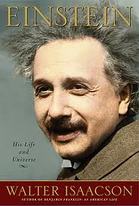|
I really enjoyed the biography of Steve Jobs by Walter Isaacson, and so I decided to check out his book on Einstein: His Life and Universe.
I enjoyed the book a lot and learned a lot of interesting details about the time period Einstein lived in and the hard work behind the science he discovered. I was fascinated by the amount of handwritten letters that went back and forth across continents and between friends, family, and work colleagues; people got so much done back then even without email! And people were obviously more patient. I was also inspired by the sheer quantity of hard work that Einstein put in to come up with his theories and papers. I also liked learning that a lot of his discoveries came about through active discussions and collaboration with other physicists, all of whom helped each other out. I also saw how Einstein was (for much of his life) a true scientist willing to abandon his own theories quickly when they didn't stand up to real world testing and how easily he could get up from failure and try again, each time 100% confident something would work. In that sense, Einstein was a true experimentalist and reminded me of the atitude entrepreneurs need to have when pivoting and approaching businesses from a lean standpoint. I also realized that Einstein was quite a complex person, not just a solitary "nerd" but one with intense emotions and "complicated" relationships with people; some people he was extremely close to, and it seems like he used science to escape from difficult emotional situations but that he also craved human contact and developed strong friendships with fellow scientists.This is a great read for anyone interested in science. The book explains a lot of Einstein's theory in plain language, and the reader can get a good sense for concepts like special relativity, wave-particle duality, and (high-level) general relativity. My full notes on the book are below. Ch. 1: Light Beam Rider
Ch. 25: The End
3 Comments
2/27/2012 02:11:46 am
Just one small point on your writing "Offered her Noble Prize if gave divorce." Contrary to common belief, Einstein did not actually give the Nobel Prize money to his first wife. To persuade a reluctant Mileva to agree to a divorce, in 1917 Einstein proposed that the anticipated Nobel money be placed in trust in a bank in Switzerland (Maric and the two sons were living in Zurich) on which Maric could draw the interest, but only use the capital with Einstein's consent. This was agreed in the divorce settlement, which also stipulated that in the event of Maric's remarriage the remaining capital would go to their sons. (See volume 5 of the Einstein Collected Papers.)
Reply
Max
2/27/2012 03:04:47 am
Thanks for clarifying. Yes, I do remember that detail from the book as well.
Reply
Stan Ince
9/12/2022 02:45:00 pm
Thank you very much for your useful notes. They have really helped me to navigate to a section I wanted to go back and read again.
Reply
Your comment will be posted after it is approved.
Leave a Reply. |
Archives
June 2024
Categories
All
Subscribe |

 RSS Feed
RSS Feed
